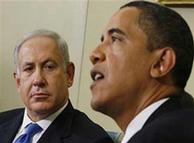Middle East | 19.05.2009
US-Israeli talks fail to mend rift over two-state solution and settlements
Benjamin Netanyahu's first visit to the Oval Office did not bring about the easing of tensions that the international community had hoped for. The Israeli prime minister did not endorse a two state solution while in Israel itself, a new settlement in the West Bank is on the agenda. On both of those issues US President Barack Obama had hoped to sway the Israeli leader towards compromise.
"It is, I believe, in the interests not only of the Palestinians, but also the Israelis and the United States and the international community to achieve a two-state solution, in which Israelis and Palestinians are living side by side in peace and security," Obama said.
The US president also urged Netanyahu to freeze Jewish settlement building in the West Bank, warning that "we have seen progress stalled on this front. Settlements have to be stopped in order for us to move forward."
The meeting took place only hours after reports emerged in Israel that the government appears to plan a new settlement in the West Bank.
Netanyahu says he's ready to talk to Palestinians
 Bildunterschrift: Großansicht des Bildes mit der Bildunterschrift: Obama with Israeli Prime Minister Benjamin Netanyahu
Bildunterschrift: Großansicht des Bildes mit der Bildunterschrift: Obama with Israeli Prime Minister Benjamin Netanyahu
The two leaders tried to paper over their differences but it was obvious that there was considerably less agreement than Washington had hoped for. Netanyahu expressed his readiness to talks with the Palestinians but stopped short of mentioning a two-state solution.
Instead he only spoke of an "arrangement where Palestinians and Israelis live side by side in dignity, security and in peace."
There was yet another issue on the agenda of the talks: Iran. And it was clearly Teheran's nuclear ambitions that were Netanyahu's prime concern for the talks. "The worst danger we face is that Iran would develop nuclear military capabilities," he said.
Israel is in favor of stepping up the pressure right away, to force Teheran to abandon its nuclear program. Barack Obama however said he will wait until Iran's general elections are over to only then start negotiations with Teheran. But he sought to reassure Israel that Washington will not "talk forever".
"By the end of the year we should have some sense whether we are starting to see serious movements on the part of the Iranians. We're not going to create a situation in which the talks become an excuse for inaction while Iran proceeds with developing a nuclear weapon."
European hopes set to be disappointed
The persisting rift in US-Israeli relations comes as a disappointment to many in the international community. European leaders had hoped that the hard-line stance of the new Israeli government might be softened somewhat by pressure from Washington.
Looking ahead at Netanyahu's trip to the US, German Chancellor Angel Merkel earlier this month said that there was "no alternative" to a two-state solution as the only path to peace in the Middle East.
She described the coming months as a decisive window of opportunity with a keen eye on how ties between Washington and Tel Aviv would develop.
Europe's own first experience with Israel's new leadership had been somewhat sobering. Earlier this month, Foreign Minister Avigdor Lieberman toured the EU to a much disillusioning effect.
The ultranationalist Lieberman has rejected the idea of a Palestinian state and has announced that Israel was no longer bound by the so-called Annapolis peace process which formed the basis of Israeli-Palestinian peace talks in 2008.
 Bildunterschrift: Großansicht des Bildes mit der Bildunterschrift: Israeli Foreign Minister Lieberman found little to agree on with his French counterpart Kouchner Meeting Lieberman in Berlin earlier this month, Germany's Foreign Minister Frank Walter Steinmeier had underlined Berlin's "expectation that the new Israeli government maintain its commitment to results produced in previous talks and the goal of a two-state solution."
Bildunterschrift: Großansicht des Bildes mit der Bildunterschrift: Israeli Foreign Minister Lieberman found little to agree on with his French counterpart Kouchner Meeting Lieberman in Berlin earlier this month, Germany's Foreign Minister Frank Walter Steinmeier had underlined Berlin's "expectation that the new Israeli government maintain its commitment to results produced in previous talks and the goal of a two-state solution."
Steinmeier's French counterpart Bernard Kouchner equally insisted that the creation of a Palestinian state was central to any chance of peace.
The EU's external relations commissioner Benita Ferrero-Waldner warned last month that a planned upgrade of bilateral relations between Israel and the EU could not come about until the government in Tel Aviv commits to the peace talks with the Palestinians.
In a reaction to Netanyahu's meeting with Obama, the Palestinian chief negotiator Saeb Erekat expressed his disappointement at Netanyahu's stance but welcomed Washington's "unequivocal support" for a Palestinian state and the call to freeze settlement activity.
"The president gave voice to today's international consensus in support of the two-state solution and the establishment of an independent and sovereign Palestinian state."
ai/Reuters/dpa/AFP
Editor: Nick Amies


No comments:
Post a Comment